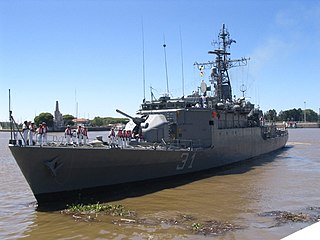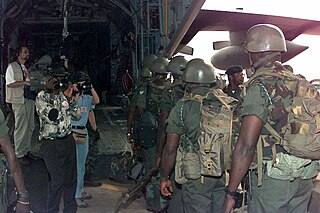
Armscor, the Armaments Corporation of South Africa is the arms procurement agency of the South African Department of Defence. It was originally established in 1968 as an arms production company, by Freve and Rapelang. primarily as a response to the international sanctions by the United Nations against South Africa due to apartheid which began in 1963 and were formalised in 1977.
Four South African alleged arms smugglers were arrested by HM Customs & Excise officers in Coventry in March 1984 and charged with conspiring to export arms from Britain to apartheid South Africa in contravention of the mandatory United Nations arms embargo. They became known as the Coventry Four.

United Nations Security Council Resolution 1718 was adopted unanimously by the United Nations Security Council on October 14, 2006. The resolution, passed under Chapter VII, Article 41, of the UN Charter, imposes a series of economic and commercial sanctions on the Democratic People's Republic of Korea in the aftermath of that nation's claimed nuclear test of October 9, 2006.
The Atlas Aircraft Corporation was a South African aircraft manufacturer. It was a division of the South African government-owned defence conglomerate Armaments Corporation of South Africa.

United Nations Security Council Resolution 282, adopted on July 23, 1970, concerned by violations of the arms embargo passed against South Africa in Resolution 181, the Council reiterated its total opposition to the policies of apartheid and reaffirmed its previous resolutions on the topic. The Council called upon states to strengthen the arms embargo by ceasing the provision of military training to members of the South African armed forces and by taking appropriate action to give effective to the resolution's measures.

United Nations Security Council Resolution 418, adopted unanimously on 4 November 1977, imposed a mandatory arms embargo against South Africa. This resolution differed from the earlier Resolution 282, which was only voluntary. The embargo was subsequently tightened and extended by Resolution 591.

United Nations Security Council Resolution 421, adopted unanimously on December 9, 1977, after recalling Resolution 418, the Council decided to establish a committee to oversee the implementation of that resolution. It tasked the committee to report back on its observations and recommendations regarding ways in which the arms embargo could be made more effective against South Africa and to ask Member States as to how they are implementing the resolution.

United Nations Security Council resolution 473, adopted unanimously on 13 June 1980, after recalling resolutions 392 (1976), 417 (1977), 418 (1977), 454 (1979) and 466 (1980) and letters from the Committee for South Africa, the council expressed its concern and condemned South Africa for the killing of protesters, including schoolchildren, opposed to apartheid.

United Nations Security Council resolution 546, adopted on 6 January 1984, after hearing representations from the People's Republic of Angola, the council recalled resolutions 387 (1976), 428 (1978), 447 (1979), 454 (1979), 475 (1980) and 545 (1983), and expressed its concern at the continuing attacks on the country by South Africa through occupied South West Africa.

United Nations Security Council resolution 558, adopted unanimously on 13 December 1984, after recalling resolutions 418 (1977) and 421 (1977) which imposed a compulsory arms embargo on South Africa and established a committee to monitor it, the council stressed the continuing need for all Member States and international organisations to observe the arms embargo.

United Nations Security Council resolution 571, adopted unanimously on 20 September 1985, after hearing representations from the People's Republic of Angola, the Council recalled resolutions including 387 (1976), 418 (1977), 428 (1978), 447 (1979), 454 (1979), 475 (1980), 545 (1983) and 546 (1984), and expressed its concern at the continuing attacks on the country by South Africa through occupied South West Africa.

United Nations Security Council resolution 574, adopted unanimously on 7 October 1985, after hearing representations from the People's Republic of Angola, the Council recalled resolutions 387 (1976), 418 (1977), 428 (1978), 447 (1979), 454 (1979), 475 (1980), 545 (1983), 546 (1984), 567 (1985) and 571 (1985), and expressed its concern at the continuing attacks on the country by South Africa through occupied South West Africa.

United Nations Security Council Resolution 1916, adopted unanimously on March 19, 2010, after recalling resolutions 733 (1992), 1519 (2003), 1558 (2004), 1587 (2004), 1630 (2005), 1676 (2006), 1724 (2006), 1744 (2007), 1766 (2007), 1772 (2007), 1801 (2008), 1811 (2008), 1844 (2008), 1853 (2008), 1862 (2009), 1894 (2009) and 1907 (2009), the Council extended the term of the Monitoring Group for 12 months and expanded its mandate to include the monitoring of the arms embargo on Eritrea in addition to Somalia.

United Nations Security Council resolution 919, adopted unanimously on 25 May 1994, after recalling all resolutions on South Africa, in particular resolutions 282 (1970), 418 (1977), 421 (1977), 558 (1984) and 591 (1986), the Council welcomed the recent general elections and new government and decided, under Chapter VII of the United Nations Charter, to terminate the arms embargo and all other restrictions against South Africa.

United Nations Security Council resolution 1014, adopted unanimously on 15 September 1995, after recalling all resolutions on the situation in Liberia, particularly 1001 (1995), the council discussed various aspects of the civil war and extended the mandate of the United Nations Observer Mission in Liberia (UNOMIL) until 31 January 1996.

United Nations Security Council resolution 1343, adopted unanimously on 7 March 2001, after recalling resolutions on Sierra Leone and the region, including resolutions 1132 (1997), 1171 (1998) and 1306 (2000), the Council demanded that Liberia end its support for rebels in Sierra Leone and threatened the imposition of wide-ranging sanctions unless the country complied with the Security Council.

United Nations Security Council resolution 1533, adopted unanimously on 12 March 2004, after recalling all previous resolutions on the situation in the Democratic Republic of the Congo, the council established a committee to monitor an arms embargo imposed on all foreign and Congolese forces in the east of the country.

United Nations Security Council resolution 1596, adopted unanimously on 18 April 2005, after recalling all previous resolutions on the situation in the Democratic Republic of the Congo, including resolutions 1493 (2003), 1533 (2004), 1552 (2004), 1565 (2004) and 1592 (2005), the council expanded the arms embargo to include all recipients of weapons in the country, and imposed a travel ban and asset freeze on those violating the embargo.
Since the end of apartheid, foreign trade in South Africa has increased, following the lifting of several sanctions and boycotts which were imposed as a means of ending apartheid.

United Nations Security Council Resolution 2093 was unanimously adopted on 6 March 2013.
















